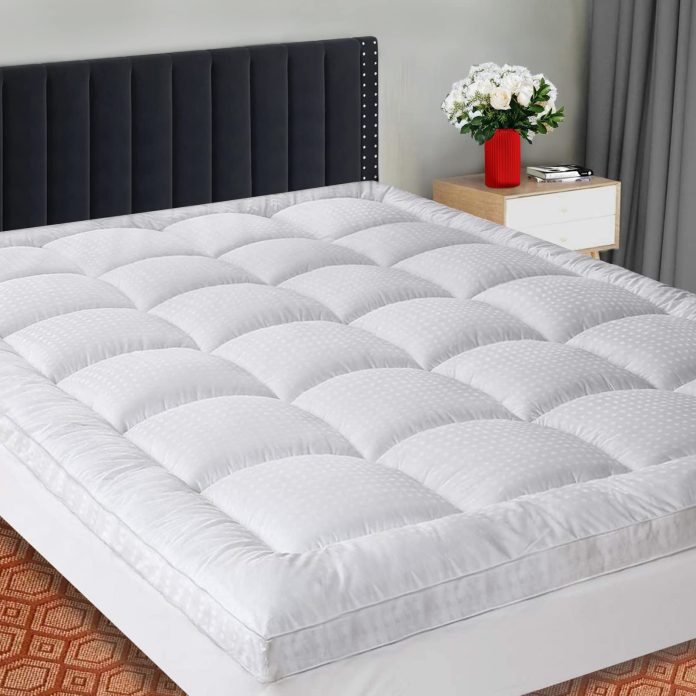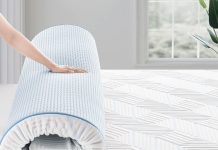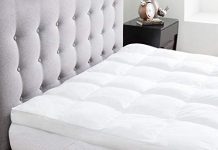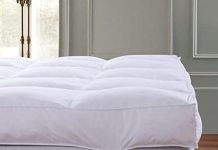Looking to enhance the comfort level of your mattress? Look no further! In this article, we explore the magic of mattress toppers and their thickness levels to find out which one offers the ultimate comfort experience. We’ll delve into the importance of finding the right thickness to cater to your unique preferences and sleep needs. So, get ready to transform your sleeping experience as we uncover the secret to finding the perfect thickness of mattress topper for the most heavenly slumber.
Review contents
1. Introduction
Welcome to our comprehensive guide on mattress toppers! Whether you’re looking to enhance the comfort of your current mattress or searching for a solution to alleviate discomfort while you sleep, a mattress topper can be a game-changer. In this article, we’ll delve into everything you need to know about mattress toppers, including their purpose, different types, factors that affect comfort, recommended thicknesses based on sleeping preferences, and special considerations. So let’s dive in and discover the key to a better night’s sleep!
2. Understanding Mattress Toppers
2.1 What is a Mattress Topper?
A mattress topper is an additional layer of cushioning material that sits on top of your existing mattress. It acts as a buffer between you and the mattress, providing extra comfort and support. Mattress toppers can be made from various materials, each offering unique features and benefits. Whether you’re looking for a plush, contoured, or firm feel, there’s a mattress topper out there to suit your preferences.
2.2 Types of Mattress Toppers
Mattress toppers come in a variety of materials, each with its own advantages and characteristics. Here are a few popular types:
-
Memory Foam: Memory foam mattress toppers conform to your body shape, providing excellent pressure relief and reducing motion transfer. They are ideal for those who prefer a contouring and plush feel.
-
Latex: Latex mattress toppers are known for their buoyant and responsive nature. They offer excellent support and are naturally hypoallergenic, making them a great option for allergy sufferers.
-
Wool: Wool mattress toppers regulate body temperature effectively, providing warmth in cold weather and wicking away moisture in warmer climates. They offer a plush and cozy feel.
-
Feather and Down: Feather and down mattress toppers provide a luxurious and soft surface to sleep on. They offer good insulation and breathability, keeping you warm in winter and cool in summer.
-
Polyester and Microfiber: These synthetic materials offer a budget-friendly solution for those seeking extra comfort without breaking the bank. They provide a soft and plush feel.
3. Factors Affecting Comfort
When choosing a mattress topper, it’s essential to consider certain factors that may affect your overall comfort and sleep experience.
3.1 Materials Used
Different materials have different characteristics that can impact the overall comfort of a mattress topper. For example, memory foam toppers provide excellent contouring and pressure relief, while latex toppers offer more responsiveness and support. Consider your personal preferences and any specific requirements to determine the material that will best suit your needs.
3.2 Body Weight and Sleeping Position
Your body weight and preferred sleeping position play a crucial role in determining the ideal mattress topper thickness. Heavier individuals may benefit from thicker toppers to prevent excessive sinking and improve support. Side sleepers might prefer a softer topper to relieve pressure on their hips and shoulders, while back and stomach sleepers may find firmer toppers more supportive.
3.3 Sleeping Temperature
If you tend to sleep hot or cold, the choice of mattress topper can make a significant difference in your comfort. Some materials, like memory foam, have a reputation for retaining heat, while materials like wool and latex offer better temperature regulation. Consider your sleeping temperature preferences when selecting a mattress topper.
3.4 Current Mattress Condition
The condition of your underlying mattress can also affect the comfort provided by a mattress topper. If your mattress is sagging or showing signs of wear and tear, a topper may not be sufficient to address all the issues. In such cases, it may be worth considering investing in a new mattress instead of relying solely on a topper.
4. Recommended Thicknesses for Different Sleeping Preferences
Different sleeping preferences call for varying levels of mattress topper thickness. Here are some recommendations based on comfort preferences:
4.1 Soft and Plush Comfort
If you’re looking for a soft and plush feel, a mattress topper with a thickness of 2 to 3 inches should suffice. This thickness allows for adequate contouring and pressure relief, providing a cozy sleeping surface.
4.2 Medium-Firm Support
For those who prefer a balance between softness and support, a mattress topper with a thickness of 3 to 4 inches can be an excellent choice. This thickness provides enough cushioning for comfort while offering ample support to prevent sinking.
4.3 Firm and Contoured Feel
If you prefer a firmer mattress surface that offers good support and contouring, a mattress topper with a thickness of 4 to 6 inches may be more suitable. This added thickness helps distribute body weight evenly, reducing pressure points and ensuring proper spinal alignment.
5. Special Considerations
In addition to comfort, there are a few special considerations to keep in mind when choosing a mattress topper.
5.1 Heat Retention
Some mattress toppers have a tendency to retain heat, which can be uncomfortable for those who sleep hot. If you’re prone to overheating during the night, opt for materials like latex or wool that provide better breathability and temperature regulation.
5.2 Allergies and Sensitivities
If you have allergies or sensitivities, it’s important to choose a mattress topper that is hypoallergenic and resistant to dust mites. Materials like latex and wool are naturally hypoallergenic, making them suitable options for individuals with allergies.
5.3 Movement Isolation
If you share your bed with a partner who tends to toss and turn during the night, a mattress topper with good motion isolation can help minimize disturbances. Memory foam and latex toppers are excellent choices as they absorb and isolate motion, allowing you and your partner to enjoy uninterrupted sleep.
6. Conclusion
Choosing the right mattress topper can greatly enhance your sleeping experience by providing added comfort and support. Consider factors such as materials, body weight, sleeping position, sleeping temperature, and current mattress condition when selecting the appropriate thickness for your needs. Remember to also take special considerations into account, such as heat retention, allergies, and movement isolation. With these considerations in mind, you’re now equipped to make an informed decision and enjoy a restful night’s sleep on your newfound mattress topper. Sleep tight!
























